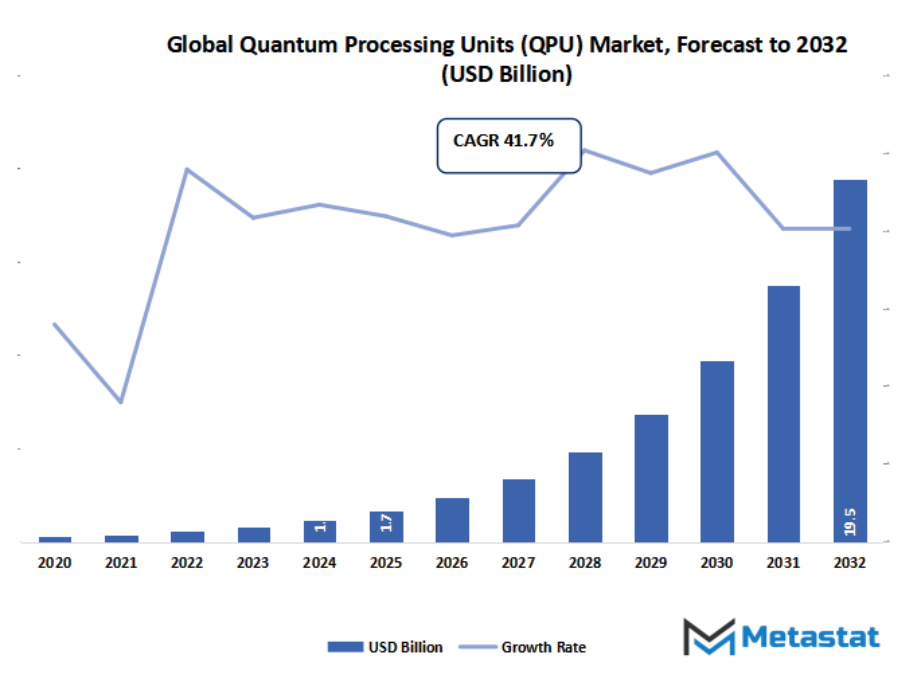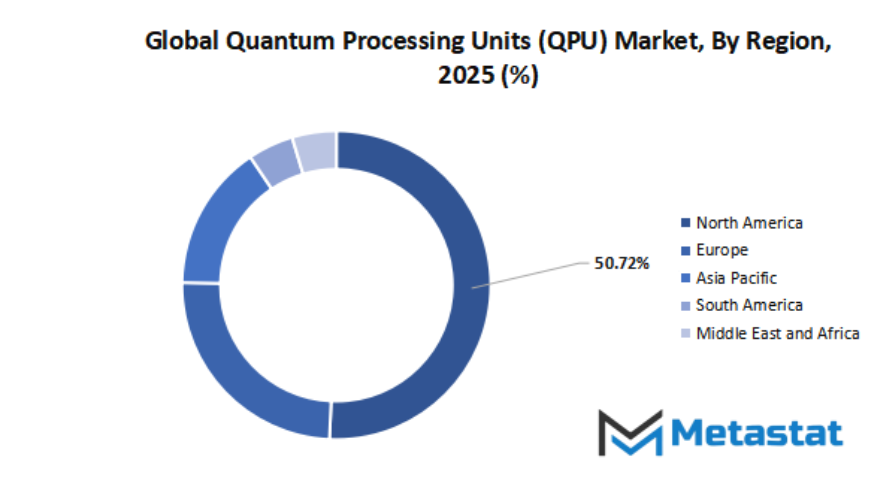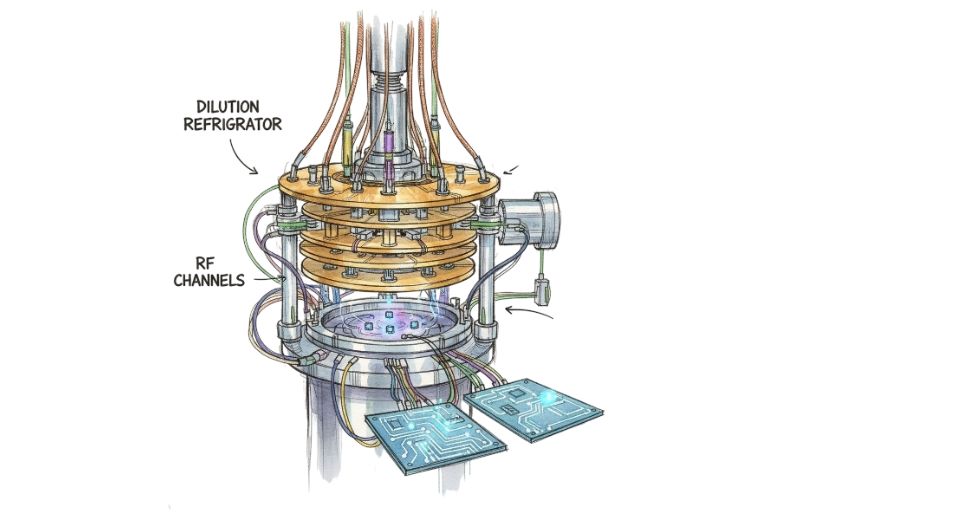Global Quantum Processing Units (QPU) Market - Comprehensive Data-Driven Market Analysis & Strategic Outlook
The global quantum processing units (QPU) market will be at the leading edge of technological change, influencing industries reliant on fast computation and smart data management. As technology advances beyond what conventional computing can handle, the QPU market will become the focal driver of the next wave of digital infrastructure. Established on the foundations of quantum mechanics, QPUs will not only improve computational efficiency but open new doors to simulation, data encryption, and problem-solving that heretofore were considered impossible using classical systems.
- Global quantum processing units (QPU) market valued at approximately USD 1.7 Billion in 2025, growing at a CAGR of around 41.7% through 2032, with potential to exceed USD 19.5 Billion.
- Hardware account for nearly 60.7% market revenues, driving innovation and expanding applications through intense research.
- Key trends driving growth: Increasing demand for high-performance computing in pharmaceuticals, finance, and AI accelerates QPU adoption., Significant investments by tech companies and governments boost quantum technology development.
- Opportunities include Expanding use in cryptography and advanced simulations opens new commercial applications.
- Key insight: The market is set to grow exponentially in value over the next decade, highlighting significant growth opportunities.

Can quantum processing gadgets clearly revolutionize computing energy beyond classical limits, or will technical and scalability demanding situations slow their adoption? How will industries adapt to the disruptive capacity of QPUs as quantum algorithms evolve and reshape existing computational fashions? Could early investments in quantum generation outline the next generation of innovation, or will uncertainty round standardization and fee preserve the marketplace back?
In the forthcoming years, the global quantum processing units (QPU) market will transcend the confines of experimental installations and research facilities. It will advance to massive deployment in finance, healthcare, energy, and defense industries where intricate data analysis requires unprecedented processing speed. This transformation will also redefine organizational design of algorithms, data security, and decision-making optimization systems. The sector will also see convergence of quantum hardware developers, cloud computing providers, and government research initiatives, facilitating more organized and pragmatic application of quantum technologies.
Market Segmentation Analysis
The global quantum processing units (QPU) market is mainly classified based on Offering, Technology, Application, Industry Vertical.
By Offering is further segmented into:
- Hardware: The hardware division of the global quantum processing units (QPU) market will undergo massive growth as sectors shift towards superior computing systems with the ability to address highly complicated problems of data. Future technology advancements will focus on the development of scalable quantum architectures that will lead to increased accuracy and speed, ultimately enhancing problem-solving efficiency in various industries.
- Software: The software component of the market will be a key contributor to filling the gap between traditional computing and quantum technology. Future software platforms will allow for greater optimization and compatibility of algorithms so that organizations can effectively leverage quantum computing power for real-world applications like simulation and cryptography.
- Services: Services in the market will see rapid expansion with growing need for consulting, maintenance, and integration support. Attention will be diverted toward supporting enterprises to migrate from conventional to quantum-based solutions, facilitating smooth migration and mitigating operational issues in the adoption stage.
By Technology the market is divided into:
- Trapped Ions: Trapped ion technology will continue to be in the spotlight within the global quantum processing units (QPU) market because of its precision and extended coherence times. This technology will be used to establish stable and fault-tolerant quantum systems, which will deliver more reliable computations for research, simulation, and solution processes.
- Superconducting Processors: Superconducting processors will continue to be a commanding segment of the market due to their quicker processing speed and ease of use with current technologies. Large-scale quantum computing networks will be supported by these processors, enabling industries to produce better performance and quicker computation.
- Photonic Processors: Photonic processors will continue to gain increased usage in the market with their use of light particles to transfer data. Their future would be based on energy efficiency, increased data processing speed, and possible integration into telecommunication and AI-driven applications with high-speed connectivity needs.
- Others: Others in the global quantum processing units (QPU) market, including topological qubits and neutral atoms, will evolve over time, with improved scalability and lower error rates. Research will continue to result in more stable systems with the ability to solve higher-level computational problems efficiently.
By Application the market is further divided into:
- Factory Automation: Factory automation will gain from the global quantum processing units (QPU) market with the optimization of sophisticated manufacturing processes. The future developments will enable industries to maximize production efficiency, automate supply chain processes, and introduce predictive maintenance systems based on real-time quantum calculations. Material science application in the market will evolve through the facilitation of quicker simulations and molecular structure analysis. Quantum computing will facilitate the discovery of new materials and compounds with better properties for aerospace, electronics, and renewable energy industries.
- Environment Monitoring: Environmental monitoring applications in the market will grow as quantum processing helps in the analysis of extensive environmental data. This will enable scientists to make improved models for climate forecasting, pollution management, and efficient resource utilization.
- Cybersecurity: Cybersecurity will become one of the most important uses in the market. Future applications will involve the application of quantum encryption to protect communication channels to ensure defense against data breaches and unauthorized access.
- Others: Other industries in the market, such as healthcare and pharmaceuticals, will use quantum computing for accelerated diagnosis, drug development, and process optimization, resulting in more efficient results and cost-efficient solutions.
By Industry Vertical the global quantum processing units (QPU) market is divided as:
- Logistics: In logistics, the global quantum processing units (QPU) market will revolutionize supply chain management by route optimization, enhanced utilization of resources, and decreasing the cost of operations. Real-time decision-making through complex data computation will be made possible through future developments.
- Automotive & Transportation Automotive and transportation industries will leverage the market for developing safer, smarter, and extra green cars. Quantum computing will facilitate visitors optimization, autonomous using algorithms, and electricity-green machine modeling.
- Industrial: Industrial uses of the market will include predictive maintenance, quality control, and system optimization. Quantum-based models will increase operating accuracy and productivity in manufacturing units.
- Chemicals: The chemicals industry will leverage the market to accelerate chemical reaction modeling and molecular simulation. This will assist in developing sustainable materials, enhancing formulation, and lowering experiment costs.
- Environment: The market applications in the environment will be directed toward climate modeling as well as renewable energy optimization. Quantum computing will enable improved analysis of energy distribution and environmental impact patterns.The BFSI industry will benefit from the market with enhanced risk evaluation, fraud detection, and portfolio optimization. Future systems will facilitate speedier data analysis and safe transaction handling.
- Others: Other sectors in the global quantum processing units (QPU) market, including healthcare, education, and telecommunication, will incorporate quantum technology to improve operational efficiency, data security, and innovation in problem-solving procedures.
|
Forecast Period |
2025-2032 |
|
Market Size in 2025 |
$1.7 Billion |
|
Market Size by 2032 |
$19.5 Billion |
|
Growth Rate from 2025 to 2032 |
41.7% |
|
Base Year |
2024 |
|
Regions Covered |
North America, Europe, Asia-Pacific, South America, Middle East & Africa |
Geographic Dynamics
Based on geography, the global quantum processing units (QPU) market is divided into North America, Europe, Asia-Pacific, South America, and Middle East & Africa. North America is further divided in the U.S., Canada, and Mexico, whereas Europe consists of the UK, Germany, France, Italy, and Rest of Europe. Asia-Pacific is segmented into India, China, Japan, South Korea, and Rest of Asia-Pacific. The South America region includes Brazil, Argentina, and the Rest of South America, while the Middle East & Africa is categorized into GCC Countries, Egypt, South Africa, and Rest of Middle East & Africa.

Competitive Landscape & Strategic Insights
The global quantum processing units (QPU) market is developing into one of the most lucrative fields of contemporary technology. With a growing interest in quantum computing, manufacturers are competing to create hardware that is capable of processing complex data quicker and more economically than conventional systems. Quantum Processing Units will process enormous amounts of data using the fundamentals of quantum mechanics, enabling them to execute calculations that will take years for traditional computers. With industries such as healthcare, finance, and cybersecurity starting to look into quantum technologies, the QPU market will continue to pick up, fueled by investments and government support.
The market nowadays is prompted with the aid of each traditional multinational corporations and increasingly more progressive local groups. The key players here include Accenture percent, Amazon Web Services, Inc., D-Wave Quantum Inc., Fujitsu Limited, Intel Corporation, International Business Machines Corporation, Microsoft Corporation, NVIDIA Corporation, QuantWare, Rigetti Computing, Inc., and Toshiba Digital Solutions Corporation. Such organizations are not best increasing research horizons however additionally striving to popularize quantum computing for business packages. Their interest in creating real-world applications, cloud-based quantum services, and scalable architectures is a pointer to how the market will shape up over the next few years.
Research and development investment is one of the key drivers behind the QPU market. Most technology companies are establishing specific labs and partnerships with universities to investigate how quantum computing has the potential to revolutionize actual problem-solving. They are investigating its applications to optimize logistics, drug discovery, and encryption, for example.Hybrid systems, which make up of classical and quantum processors, will slim the space among contemporary potential and future abilities. As hardware and software program integration improves, the era becomes greater strong and reliable, attracting broader adoption.
But progress closer to huge-scale commercialization isn't with out challenges. Quantum computing desires correct situations like extraordinarily bloodless temperatures and stable situations, which can be costly to supply and preserve. In addition, the shortage of professional experts in quantum engineering and the problem of making algorithms to be used in quantum structures are setbacks to fast improvements. Be that as it may, increased cooperation between government agencies, research institutions, and private companies is expected to accelerate technological advancements.
In the coming years, the global quantum processing units (QPU) market will be at the forefront of leading the next generation of computing technology. With involvement from key industry players and emerging startups, the industry is likely to see game changers that will reshape data processing, artificial intelligence, and secure communication. As businesses continue to explore and innovate, the QPU market will serve as a beacon of technological advancement and humanity's determination to extend computational horizons further than ever before.
Market Risks & Opportunities
Restraints & Challenges:
High operational costs and complex infrastructure limit widespread QPU deployment. - High costs of operation and intricate infrastructure restrict mass deployment of QPUs. The global quantum processing units (QPU) market will enjoy setbacks because the set up and renovation of quantum technology require heavy investment in quantum error correction technologies, cooling technology, and controlled environmental conditions. Such technical in addition to economic requirements will avoid the speed of industrial scaling, and it turns into greater tough for maximum industries to put into effect the era efficaciously.
Limited availability of skilled quantum computing professionals slows market growth. - Shortage of experienced quantum computing specialists hinders the boom of the marketplace. The market is probable to revel in talent deficits because it calls for rare competencies in quantum physics, advanced mathematics, and designing quantum algorithms. Training packages and academic schemes might require time to fill this gap, influencing the charge of technological innovation and commercial utility.
Opportunities:
Expanding use in cryptography and advanced simulations opens new commercial applications. - Growing applications in cryptography and complex simulations create new enterprise uses. The global quantum processing units (QPU) market will see sturdy ability as industries pursue solid verbal exchange networks and quantum-driven modeling for prescription drugs, finance, and substances technological know-how. Those improvements will revolutionize records safety, speed molecular breakthroughs, and redefine laptop trouble-fixing, developing a future wherein quantum structures are on the heart of global digital infrastructure.
Forecast & Future Outlook
- Short-Term (1–2 Years): Recovery from COVID-19 disruptions with renewed testing demand as healthcare providers emphasize metabolic risk monitoring.
- Mid-Term (3–5 Years): Greater automation and multiplex assay adoption improve throughput and cost efficiency, increasing clinical adoption.
- Long-Term (6–10 Years): Potential integration into routine metabolic screening programs globally, supported by replacement of conventional tests with advanced biomarker panels.
Market size is forecast to rise from USD 1.7 Billion in 2025 to over USD 19.5 Billion by 2032. Quantum Processing Units (QPU) will maintain dominance but face growing competition from emerging formats.
In addition, the development of hybrid systems in which quantum and classical processors collaborate will bring scalable solutions to industries that are dependent on predictive analytics and automation. With further advancements in quantum materials and architecture, the global quantum processing units (QPU) market will find its uses moving beyond theoretical applications, turning into concrete business value and innovation. With a growing emphasis on creating cost-effective quantum chips and affordable cloud-based platforms, this sector will bring the world closer to defining the future of global computation, providing solutions that will change the way information is processed and used in the contemporary world.
Report Coverage
This research report categorizes the global quantum processing units (QPU) market based on various segments and regions, forecasts revenue growth, and analyzes trends in each submarket. The report analyses the key growth drivers, opportunities, and challenges influencing the global quantum processing units (QPU) market. Recent market developments and competitive strategies such as expansion, type launch, development, partnership, merger, and acquisition have been included to draw the competitive landscape in the market. The report strategically identifies and profiles the key market players and analyses their core competencies in each sub-segment of the global quantum processing units (QPU) market.
Quantum Processing Units (QPU) Market Key Segments:
By Offering
- Hardware
- Software
- Services
By Technology
- Trapped Ions
- Superconducting Processors
- Photonic Processors
- Others
By Application
- Factory Automation
- Material Science
- Environment Monitoring
- Cybersecurity
- Others
By Industry Vertical
- Logistics
- Automotive & Transportation
- Industrial
- Chemicals
- Environment
- BFSI
- Others
Key Global Quantum Processing Units (QPU) Industry Players
- Accenture plc
- Amazon Web Services, Inc.
- D-Wave Quantum Inc.
- Fujitsu Limited
- Intel Corporation
- International Business Machines Corporation
- Microsoft Corporation
- NVIDIA Corporation
- QuantWare
- Rigetti Computing, Inc.
- Toshiba Digital Solutions Corporation
WHAT REPORT PROVIDES
- Full in-depth analysis of the parent Industry
- Important changes in market and its dynamics
- Segmentation details of the market
- Former, on-going, and projected market analysis in terms of volume and value
- Assessment of niche industry developments
- Market share analysis
- Key strategies of major players
- Emerging segments and regional growth potential








 US: +1 3023308252
US: +1 3023308252






